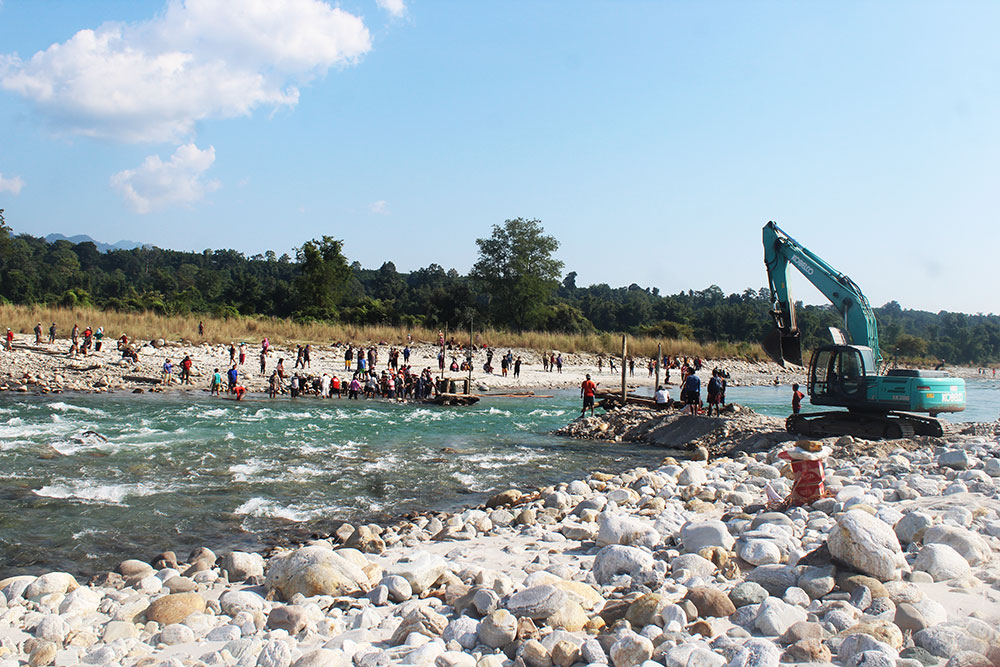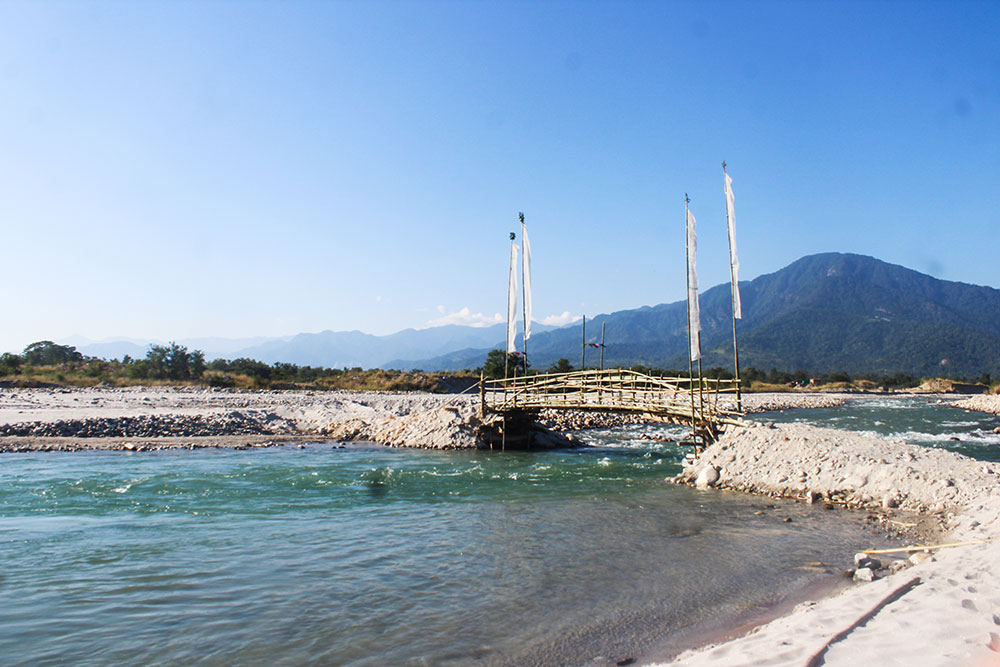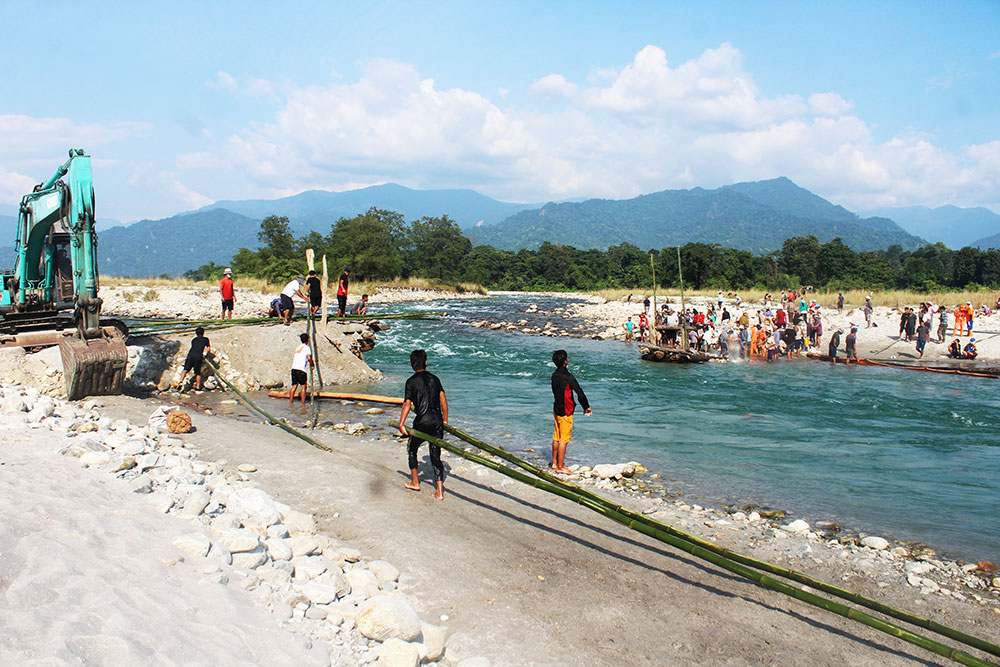Villagers come together to build another temporary bridge over Maukhola
Nima | Gelephu
How does failed political promise bring people together?
The answer is here at Maukhola or Mauchhu, Gelephu. There is no time for blame games. Necessity overshadows anger, frustrations or hope. Without a sign of any progress on the promised bridge, the people have come together this winter, like many winters in the past.
The task, like every year, is to link Chuzergang gewog to the bustling Gelephu town, the commercial hub of the region. It has become an annual event – when the river subsides, people come together to build a bridge and realise their dream, even if it is for a few months. The water level is low and morale high.

An annual ritual: Villagers construct a bamboo bridge over Mauchhu to shorten the journey to Gelephu
Sunday, November 7. Villagers of Chuzergang gewog are busy carrying stones on the back and chopping logs brought down by swollen Mauchhu during monsoon to be used for the bridge.
The annual event – to build a temporary bridge over Mauchhu has begun.
Settled close to the Mauchhu, the temporary bamboo bridge once complete will come as a huge relief to the people from Chuzergang and Sershong, Umling, and Taraythang gewogs.
Four gewogs on the other side of the river depend on Gelephu for everything – from medical check-ups to buying essentials. Not everyone can afford hiring taxis every time they travel to Gelephu.

The bridge connects four gewogs on other side of Mauchhu with Gelephu
“It is expensive when the whole family has to travel. We have to pay almost Nu 1,000 a trip,” said a villager from Chuzergang.
Once the bridge, temporary it may be, is completed, Chuzergang is only 30 minutes away from Gelephu on foot. Many prefer to walk over driving or taking taxis.
More than 100 people have gathered on the banks of Mauchhu. The elderlies, who cannot swim, stay on the Chuzergang side. The younger ones who can stay afloat swim across Mauchhu.
The woman and the elderly watch the young one crossing the river in awe and appreciation. They could finally beat the dreaded Mauchhu in winter. It is clear and not murky anymore.
It is a lively event where young and old showcase their skills. The dying practice of bamboo weaving is brought alive: elderly folks from Chuzergang weave thinly cut bamboo pieces into a long bamboo slab to be used for the deck.
Almost all the young in the gewog could swim. It is time for them to showcase their swimming talent. The elderlies on the other side of the bank toss bamboo and logs into the river.
Boys dive into the emerald-colored river to drag the bamboo and logs to another side of the bank. This goes on until they have gathered enough to build a foundation for the bridge.
A young swimmer from Chuzergang, Sangay Tempa said participating in bridge construction was exciting. “I started swimming when I was 14 years old. I could make good use of this skill today,” he said.
He added that the work is also tiring, but the convenience the bridge could bring keeps him going. “It becomes convenient for us to travel at any time with the bridge. We get to learn more about the community too,” said Sangay Tempa.
Besides all the fun, solidarity, and strong sense of community, people from Chuzergang and three other gewogs hope that the election promise of a permanent bridge won’t be forgotten.
A bridge over Mauchhu was promised in all the parliamentary elections. Almost all political parties pledged a bridge over the river – not the one they are building.
Farmer Sonam said that the people expect the government to build the bridge as pledged. “We will keep building the temporary one until that happens. I am sure the government has started planning for it,” he said.
He added that it was important to build the temporary bridge. “People couldn’t wait to avail medical services. We miss some important check-ups in Gelephu. We could do all these at ease now,” said Sonam.
A woman lost one of her family members in a car accident recently. She brought refreshments for those working on the bridge.
“These are engrained in our culture. They come to do Gewa here. Some agreed to give us an excavator for free every year. It would take more than five days. Now it takes only two days,” said the farmer.
He added that everyone rushed farm work to come and take part in the bridge construction.
The budget outlay of Nu 400 million was allocated for the construction of bridge in the 12th Plan. However, the budget was re-prioritised in June last year in wake of the Covid-19 pandemic.
The estimated cost of the bridge was Nu 900 million.
Gelephu had seen their elected representative hold ministerial posts raising the hope for the bridge. It had not happened. Every candidate during elections pledged to build a bridge over Maukhola during the election period.
The people are still waiting.


